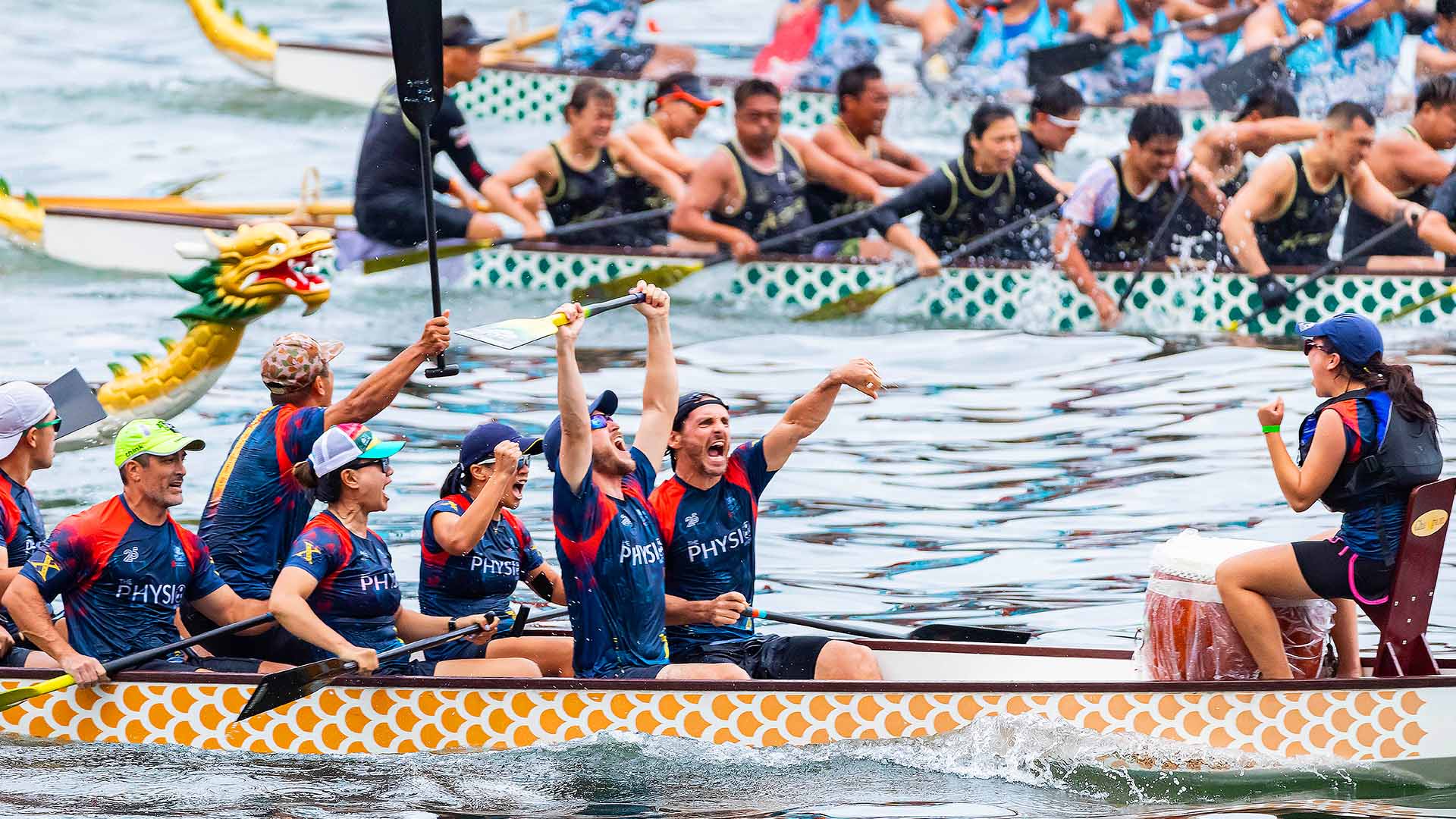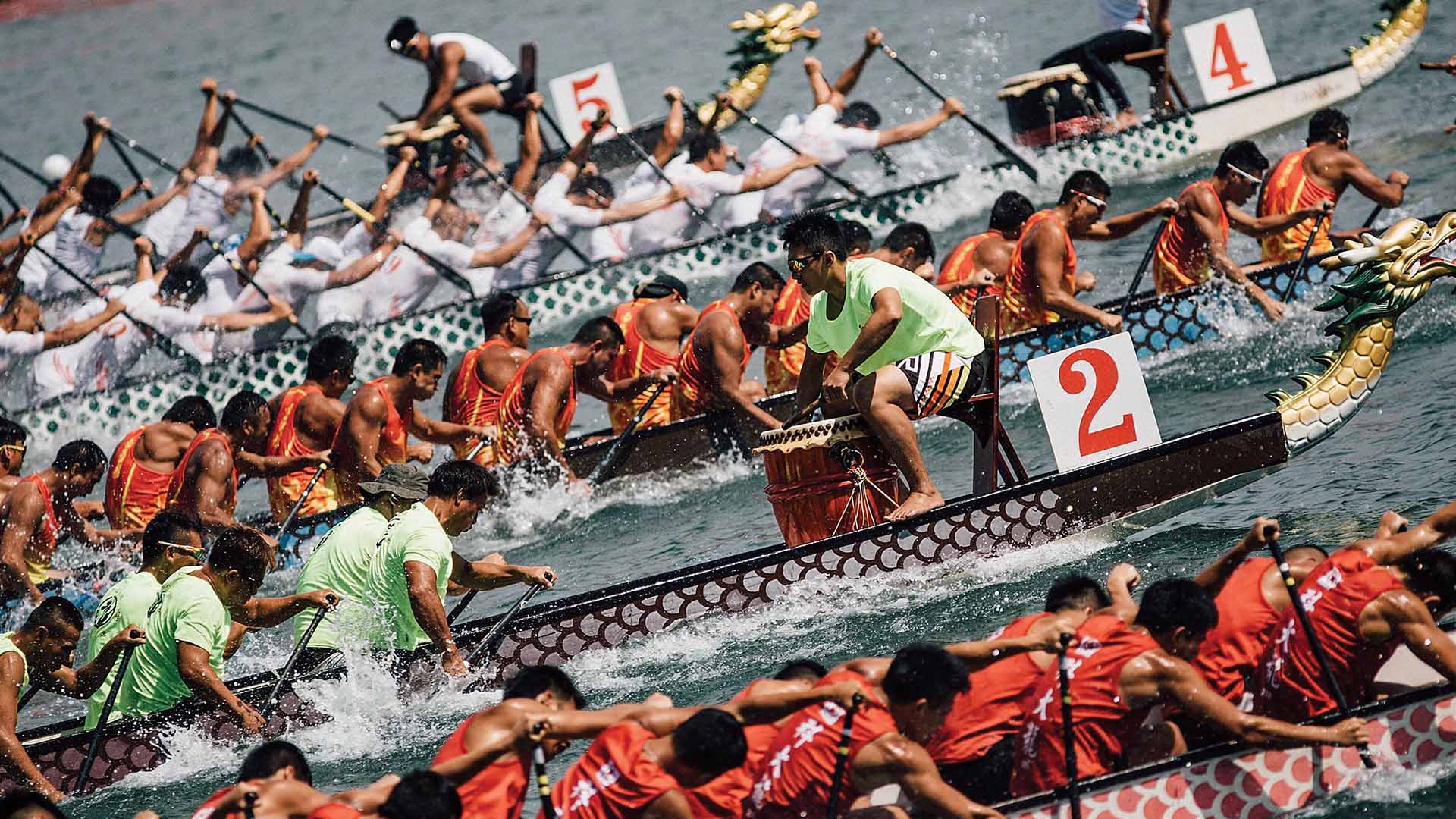
Dragon Boat Festival takes place on the fifth day of the fifth lunar month each year (i.e. late May or June). Wondering what the festival is all about, and how to celebrate it in Hong Kong? We’ve got you covered. Here’s all you need to know about the traditional holiday, from its origin to festive delicacies to a range of events and festivities — think exciting dragon boat races, like the Hong Kong International Dragon Boat Races, and Tai O Dragon Boat Water Parade. Let’s get started!
Despite many speculations around the origin of the festival, one of the more well-known ones is that the day is to honour Qu Yuan, a Chinese patriotic poet and a beloved state servant who gave his life for his country. He was, however, exiled by Emperor Huai because of false accusations and, after the next emperor surrendered the country to their rivals, Qu drowned himself in the Miluo River.
Upon hearing of Qu’s death, villagers rowed along the river to recover his body, but in vain. To prevent the fish from eating his body, they made zongzi, or glutinous rice dumplings, and threw them into the river. This has since evolved into the Chinese traditions of eating zongzi and rowing dragon boats during the festival.
Fun fact: Did you know there is a connection between the Dragon Boat Festival and plagues?
Ancient people regarded the fifth day of the fifth lunar month as the ‘evil month and evil day’. They believed it was easier to get sick on this day, so some say that the traditional Dragon Boat Festival rituals and customs are actually for driving away bad luck and plagues.

Dragon boat races have been around for more than a thousand years. The event is originated from the Lingnan region of China, where people believed the water that passed through the oars of dragon boats was auspicious. But the modern version of the races actually began in Hong Kong some 40 years ago. In 1976, the first international dragon boat race was held in Hong Kong, with nine local teams competing against a Japanese team. The competition defined the sport at an international level and laid the foundation for the dragon boat races we are so familiar with today.

Every summer, various exciting dragon boat races take place across the city. But to truly feel the heat of the Dragon Boat Festival, look no further than the Hong Kong International Dragon Boat Races, where more than 100 local and international teams gather to compete in the Victoria Harbour. What’s more, it’s free to see the races on the harbourfront!
Fun facts on the Hong Kong International Dragon Boat Races
What are the boats made of?
Dragon boats used to be made of wood, but now they’re usually made of fibreglass. With a lighter weight, the modern dragon boat can be paddled faster and won’t gain weight from absorbing water like the wooden boats do. It’s also more cost effective and environmentally friendly.
What kinds of races are there in the competition?
The competition is split into two categories: the 500 m standard boat races and the 200 m small boat races. A standard boat seats 20 paddlers, while a small boat can accommodate 12 players.
Tips to enjoy dragon boat races
As exciting as it is to watch the dragon boats cross the finish line, the start of the race, especially the first five paddles, is the key. Nothing beats watching the players paddle in unison and accelerate in tandem — a perfect show of team spirit.

Apart from watching dragon boat races, a visit to the Lamma Fisherfolk’s Village is also a must if you want to find out more about the culture and traditions of dragon boating. Located on Lamma Island, one of Hong Kong’s most popular islands, the village is home to two authentic wooden dragon boats. You can board the boats for free and try paddling and beating the drums. There are also photo spots and games for you to get a taste of the life of a fisherman.
Legend has it that a plague hit Tai O on Lantau Island back in the 19th century, so the local fishermen started a ritual to drive away the bad luck. On the fifth day of the fifth lunar month, they would parade statues of deities on small boats on the waterways. Since then, dragon boats have been used by Tai O villagers every year to honour the gods and pray for peace and health. Today, the celebration also includes traditional rituals like cai qing (‘plucking the greens’) and ‘receiving the gods’. Make sure to visit Tai O for this century-old event!

You can’t have a Dragon Boat Festival without zongzi, or glutinous rice dumplings. Many people still make their own zongzi from scratch, but most people in Hong Kong simply buy ready-made ones from restaurants, hotels or markets.
The most common zongzi in Hong Kong is the Cantonese variety, with tender pork belly, roasted duck, salted eggs, and mushrooms. Some restaurants even add luxurious ingredients like abalones, scallops and truffles. Or if you have a sweet tooth, opt for the sweet varieties with red bean paste or sweet potatoes.
FUN FACT: HOW TO CHOOSE A ZONGZI?
- There are two kinds of zongzi you need to try: savoury and sweet. A savoury zongzi should contain pork belly; the sweet version, on the other hand, is stuffed with red bean or lotus paste, but can sometimes be without a filling. The sweet rice dumplings are typically served with sugar and have a completely different taste and texture from the savoury ones, so you’ve got to try both when visiting Hong Kong!
- Note: zongzi are generally made fresh with a short shelf life, so eat them as soon as possible after purchase.
Can’t wait to buy some zongzi for Dragon Boat Festival? Read our guide to fantastic zongzi and where to find them in Hong Kong!
Information in this article is subject to change without advance notice. Please contact the relevant product or service providers for enquiries.
The Hong Kong Tourism Board disclaims any liability as to the quality or fitness for purpose of third party products and services; and makes no representation or warranty as to the accuracy, adequacy or reliability of any information contained herein.




